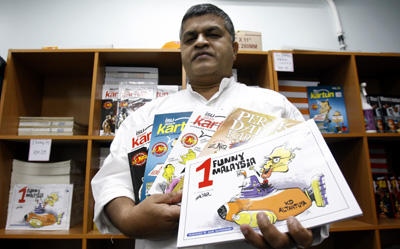Tuesday marks the next step in a legal faceoff between Malaysian authorities and the well-known political cartoonist Zulkiflee Anwar Haque, also known as Zunar. Hearings will resume in civil lawsuit filed by Zunar that challenges the legality of his arrest and detention in September 2010. Malaysian police arrested him hours ahead of the scheduled launch of a new book of political cartoons, Cartoon-o-phobia. He was held until the next day on the accusation that his book violated the country’s repressive Sedition Act. Although he was released without being formally charged, police served a search warrant at his office and seized dozens of copies of his book.
Zunar’s work, exuberant and sharp, goes after all political sides. At age 50, he doesn’t feel he has to spare any political figure, from former Prime Minister Mahathir Mohamad to current Prime Minister Najib Razak to oppositionist Anwar Ibrahim. In a 2010 interview, Zunar said his inspiration comes from Thomas Nast, the 19th American cartoonist who took on the corrupt politicians of his day.
In his current lawsuit, Zunar is seeking reimbursement for loss of earnings, along with unspecified damages that he hopes will deter officials from pursuing similar cases. But in a country where it is far more common for the government to be the complainant in press cases, challenging authorities in court takes some measure of courage. At the most recent hearing, in January, the arresting officer testified that Zunar’s work “could have created hatred, misunderstanding, confusion, and loss of trust.”
This is not the first time Zunar has gone to court in defense of his work. In June 2010, under the Printing Presses and Publishing Act (PPPA), the Home Ministry banned several compilations of his cartoons. The government asserted the cartoons, many of them critical of Razak’s administration, were “prejudicial to public order,” according to news reports. The compilations included cartoons that appeared on the independent news website Malaysiakini from 2005 to 2009 and in Isu Dalam Kartun, a monthly magazine. Zunar and Malaysiakini filed for a judicial review, but the High Court in Kuala Lumpur upheld the ban in July 2011 and threatened to revoke printers’ licenses if any dared reproduce the volumes.
Malaysian governments have long leveraged the Printing Presses and Publications Act’s many arbitrary provisions, including Home Ministry discretion over the issuance of publishing permits, to stifle press freedom. In a September 2011 speech, Prime Minister Razak promised to amend the PPPA by doing away with the legal requirement for news publications to renew their publishing licenses on an annual basis. Five months later, even that modest reform has not been made into law.
Yet were that reform to be implemented, the minister of home affairs would still retain broad authority to refuse permission to publish any materials he unilaterally determines “likely to be prejudicial to public order, morality, security … or national interest” and to revoke permits without the legal recourse of judicial review, according to the law.
Journalists may still be jailed or fined for spreading “false news” under the Printing Presses and Publication Act. And if the Sedition Act doesn’t further dampen criticism, officials can also resort to the Official Secrets Act or the Internal Security Act, which carry potential jail terms for guilty convictions, to curb media criticism and encourage self-censorship among journalists.
And that leaves Zunar, seriously, contemplating his next move.
